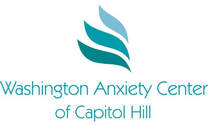At the Washington Anxiety Center of Capitol Hill, we have dedicated one clinician on staff to always be available for this program. Please call us at 202-768-6494 or email us at [email protected] if you are interested.
Exposure-based therapy (as part of cognitive-behavioral therapy) is THE most evidence-based treatment for anxiety disorders. Accelerated programs are structured to meet the individual patient’s needs. A fear and avoidance hierarchy is designed and individualized per patient and exposures adhere to this plan during the program.
This program is a great solution if you need more than 1 session a week but if a Partial Hospital Program seems too big of a step.
The majority of patients who participate in the program respond well. The aim of this program is to decrease anxiety symptoms (and depression) at a faster rate than 1x a week treatment (e.g., one can have many months of treatment in 1-3 weeks) and potentially avoid a higher level of care (e.g., IOP programs, residential, or inpatient).
We accept and encourage this service to be complementary to services you may be receiving at other practices. For example, if your therapist does not have the availability for multiple exposure sessions during the week, you can continue seeing them while you complete our program and then return to their regular care.
At this time, we offer accelerated programs for the following disorders:
Obsessive-Compulsive Disorder
4 sessions a week for 3 weeks
Panic Disorder
4 sessions a week for 1 week OR 2-3 sessions a week for 2 weeks
School Refusal
4 sessions a week for 8 consecutive weeks
Specific Phobia
1-4 hours of a single session OR 1-2 hours of 2 sessions
Depression
4 sessions a week for 4 consecutive weeks
Questions?
Q: Is this an inpatient, partial hospital, or residential program?
A: The Accelerated program is an exposure-therapy specialized program that does not fit into any of the categories listed above.
Q: Does “accelerated" mean the treatment is more difficult?
A: No, in fact, it means that it is more frequent and focused, with the hope that you are able to accomplish a lot in a shorter amount of therapeutic time.
Exposure-based therapy (as part of cognitive-behavioral therapy) is THE most evidence-based treatment for anxiety disorders. Accelerated programs are structured to meet the individual patient’s needs. A fear and avoidance hierarchy is designed and individualized per patient and exposures adhere to this plan during the program.
This program is a great solution if you need more than 1 session a week but if a Partial Hospital Program seems too big of a step.
The majority of patients who participate in the program respond well. The aim of this program is to decrease anxiety symptoms (and depression) at a faster rate than 1x a week treatment (e.g., one can have many months of treatment in 1-3 weeks) and potentially avoid a higher level of care (e.g., IOP programs, residential, or inpatient).
We accept and encourage this service to be complementary to services you may be receiving at other practices. For example, if your therapist does not have the availability for multiple exposure sessions during the week, you can continue seeing them while you complete our program and then return to their regular care.
At this time, we offer accelerated programs for the following disorders:
Obsessive-Compulsive Disorder
4 sessions a week for 3 weeks
Panic Disorder
4 sessions a week for 1 week OR 2-3 sessions a week for 2 weeks
School Refusal
4 sessions a week for 8 consecutive weeks
Specific Phobia
1-4 hours of a single session OR 1-2 hours of 2 sessions
Depression
4 sessions a week for 4 consecutive weeks
Questions?
Q: Is this an inpatient, partial hospital, or residential program?
A: The Accelerated program is an exposure-therapy specialized program that does not fit into any of the categories listed above.
Q: Does “accelerated" mean the treatment is more difficult?
A: No, in fact, it means that it is more frequent and focused, with the hope that you are able to accomplish a lot in a shorter amount of therapeutic time.

